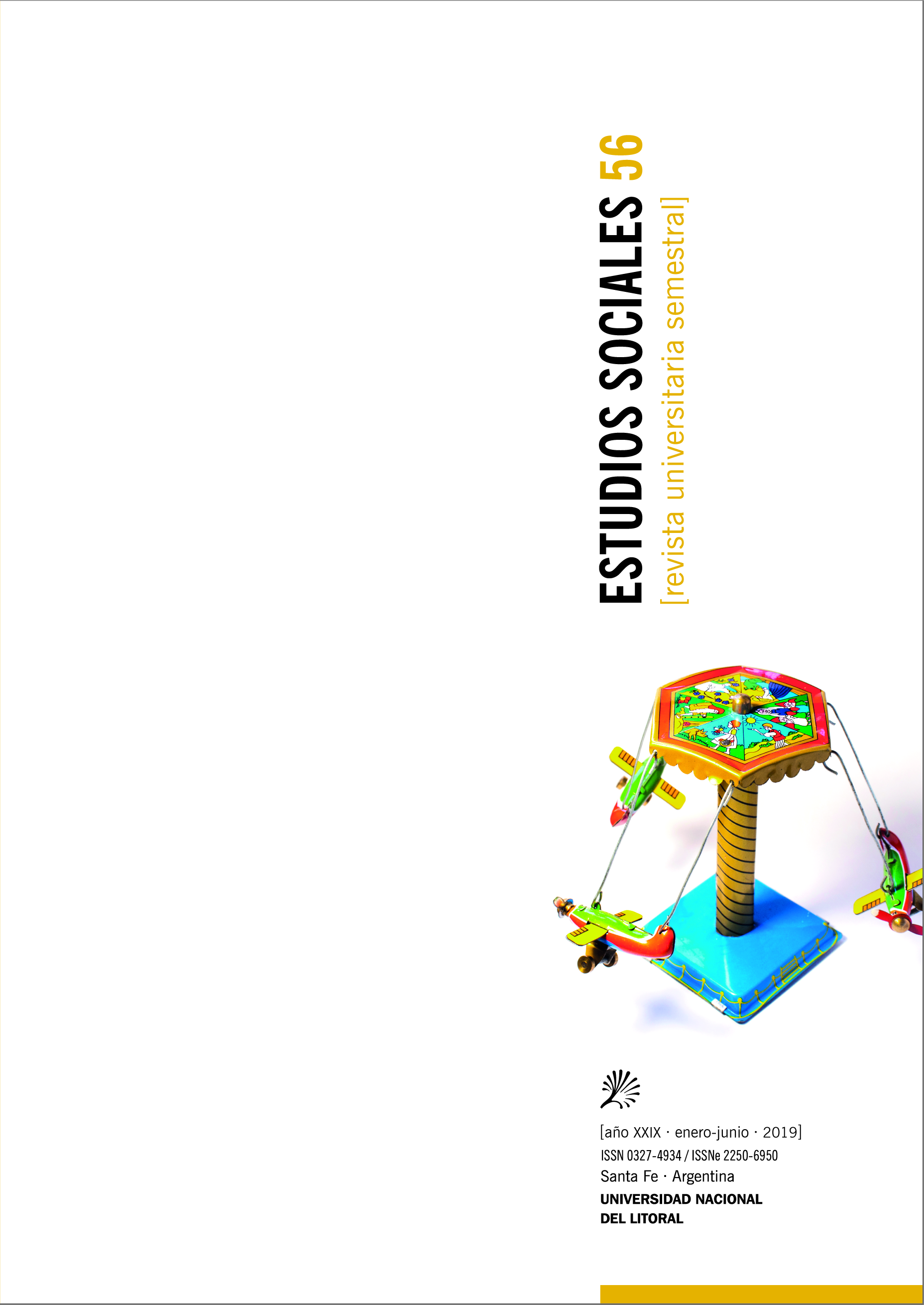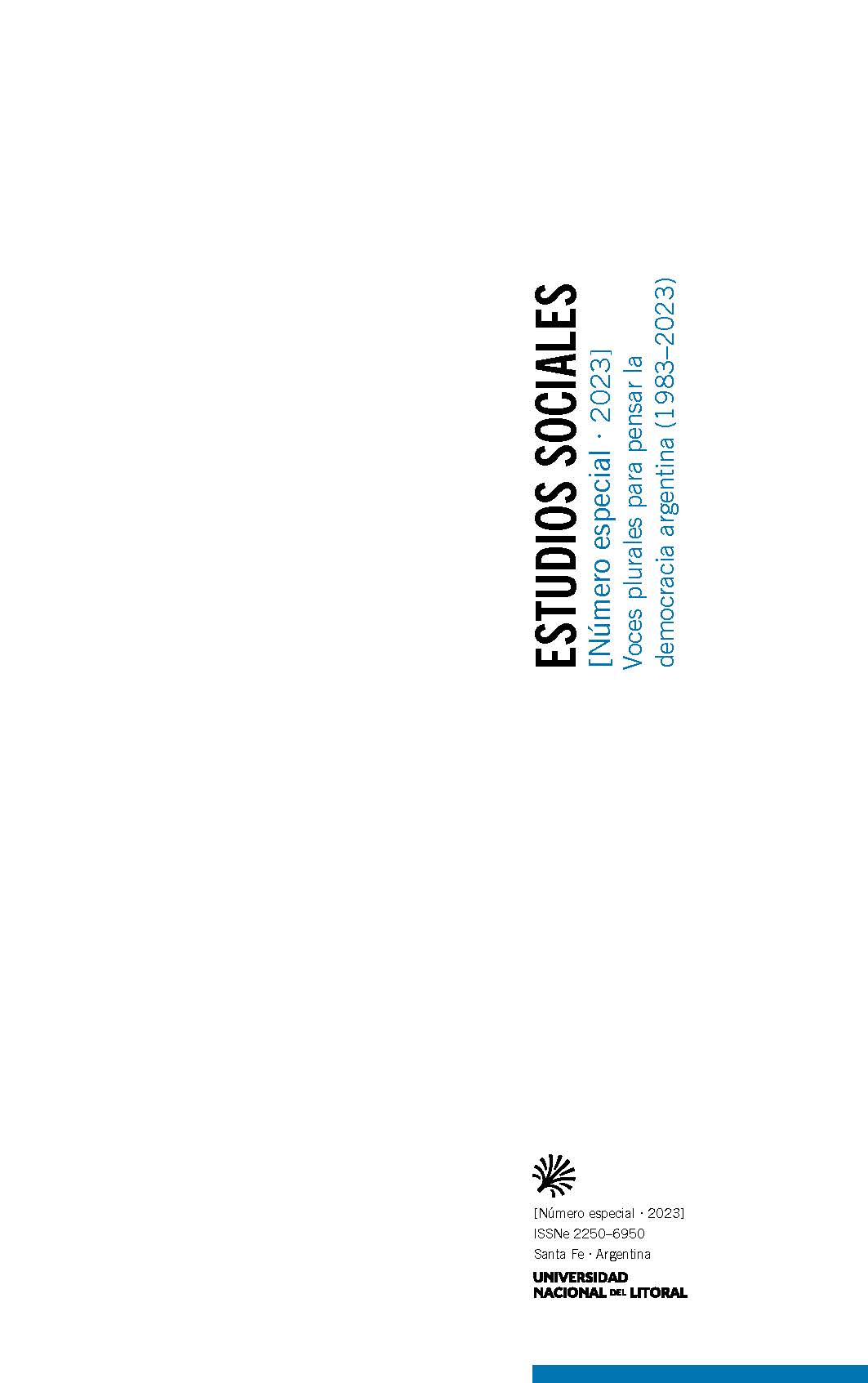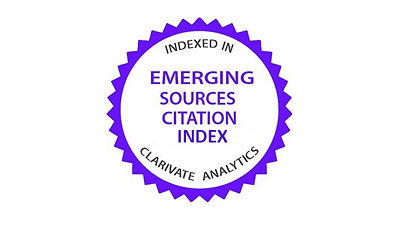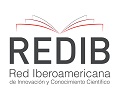Nombrar lo innombrable. La querella en torno al concepto de religión política para definir los totalitarismos
DOI:
https://doi.org/10.14409/es.v56i1.7092Palavras-chave:
Religión Política, Totalitarismo, Secularismo, Ciencia PolíticaResumo
El presente trabajo se propone presentar un episodio en el devenir histórico del concepto de Religión Política como herramienta interpretativa de los totalitarismos, el período en el cuál el concepto comienza a ser cuestionado por parte de intelectuales reconocidos. Debate en torno a la legitimidad del concepto que pensamos debe ser comprendido como un capítulo de dos de las querellas fundamentales de la modernidad: la querella en torno al significado de la secularización y en torno al status de la ciencia política. Capítulo que ha sido ignorado por los historiadores que han generado el presente renacer del concepto. A través de estos lentes se analizaran los argumentos principales de los pensadores que han participado
de este debate: Aron, Arendt, Kelsen y Voegelin.
Referências
ANGENOT , MARC (2010): «Remarques Sur Religions Séculières et Totalitarisme», en: Discours Social, vol. XX, pp. 5-38.
ARENDT, HANNAH (1999): Los Orígenes del Totalitarismo, Madrid, Taurus.
ARENDT, HANNAH (2003): «Religión y Política», en: Isegoría, nº 29, pp. 191- 209.
ARNOLD, ECKHART (2006): «Posfacio. La Nueva Ciencia de Voegelin a la Luz de la Crítica de Kelsen», en: Hans Kelsen, ¿Una Nueva Ciencia de la Política?, Buenos Aires, Katz, pp. 245-296.
ARON, RAY MOND (1967): El Opio de los Intelectuales, Buenos Aires, Edición Siglo Veinte.
ARON, RAY MOND (1990a): «Bureaucratie et Fanatisme», en: Chroniques de Guerre, Paris, Gallimard, pp. 452-465.
ARON, RAY MOND (1990b): «L’Avenir des Religions Séculières», en: Chroniques de Guerre, Paris, Gallimard, pp. 925-944.
BAEHR, PETER (2010): Hannah Arendt, Totalitarianism, and the Social Sciences, Stanford, Stanford University Press.
BLUMENBERG, HANS (2008): La legitimización de la Edad Moderna, Valencia, Pre-Texto.
BOX, ZIRA (2006): «Las Tesis de la Religión Política y sus Críticos», en: Ayer, nº 62, pp. 195-230.
BURLEIGH, MICHAEL (2013): Causas Sagradas, Madrid, Taurus.
BURRIN, PHILIPPE (1997): «Political Religion: The Relevance of a Concept», en: History and Memory, vol. 9, nº 1/2, pp. 321-349.
CASANOVA, JOSÉ (2012): Genealogía de la secularización, México, Anthropos.
DI LUCIA, PAOLO y PASSERINI GLAZEL, LO RENZO (2015): «¿Religiones sin Dios? Hans Kelsen Antropólogo de la modernidad», en: Revista de Antropología Social, nº 24, pp. 221-243.
DUCH, LLUÍS (2014): Religión y Política, Barcelona, Fragmenta Editorial.
EHRET, ULRIKE (2007): «Understanding the Popular Appeal of Fascism, National Socialism and Soviet Communism: The Revival of Totalitarianism Theory and Political Religion», en: History Compass, nº 5/4, pp. 1236-1267.
GENTILE, EMILIO (2000): «The Sacralisation of politics: Definitions, interpretations and reflections on the question of secular religion and totalitarianism », en: Totalitarian Movements and Political Religions, vol. 1, nº 1, pp. 18-55.
GENTILE, EMILIO (2004): «Fascism, totalitarianism and political religion: definitions and critical reflections on criticism of an interpretation», en: Totalitarian Movements and Political Religions, vol. 5, nº 3, pp. 326-375.
GENTILE, EMILIO (2005): «Political Religion: A Concept and its Critics», en: Totalitarian Movements and Political Religions, vol. 6, nº 1, pp. 19-32.
GENTILE, EMILIO (2006): Politics as Religion, Princenton, Princenton University Press.
GENTILE, EMILIO (2007): El Culto del Littorio. La sacralización de la política en la Italia fascista, Buenos Aires, Siglo XXI.
GESS, BRIGITTE (1996): «The Conceptions of Totalitarianism of Raymond Aron and Hannah Arendt», en: Totalitarianism Movements and Political Religions, vol.1, Nueva York, Routledge, pp. 216-225.
GRIFFIN, ROGER (2005): «Cloister or Cluster? The Implications of Emilio Gentile’s Ecumenical Theory of Political Religion for the Study of Extremism», en: Totalitarian Movements and Political Religions, vol. 6, nº 1, pp. 33-52.
GORDON, DANIEL (2011): «In Search of Limits: Raymond Aron on ‹secular religion› and communism», en: Journal of Classical Sociology, vol. 11, nº 2, pp. 139-154.
GURIAN, WALDEMAR (1952): «Totalitarian Religions», en: The Review of Politics, vol. 14, nº 1, pp. 3-14.
GURIAN, WALDEMAR (2001): «Les Totalitarismes en tant que religion politique», en: E. Traverso, Le Totalitarisme, París, Éditionsdu Seuil, pp. 448-460.
KELSEN, HANS (2006): ¿Una Nueva Ciencia de la Política?, Buenos Aires, Katz.
KELSEN, HANS (2015): Religión Secular, Madrid, Trotta.
LECOUTRE, FRANCOIS (2016): «Two Different Perspectives of the Totalitarian Phenomenon: Kelsen and Voegelin». Disponible en: https://voegelinview. com/voegelin-kelsen-totalitarianism/
LINZ, JUAN (2006): «El uso religioso de la política y/o el uso político de la religión», en: Reis, nº 114, pp. 11-36.
LÖWITH, KARL (2004): Historia del Mundo y Salvación, Buenos Aires, Katz.
MAIER, HANS (ed.) (1996a): Totalitarianism and Political Religions, vol. 1, New York, Routledge.
MAIER, HANS (1996b): «Concepts for the comparison of dictatorships: ‹totalitarianism› and ‹political religions›», en: H. Maier (ed.), Totalitarianism and Political Religions, vol.1, New York, Routledge, pp. 188- 203.
MAIER, HANS (ed.) (2003): Totalitarianism and Political Religions, vol. 3, New York, Routledge.
MAIER, HANS y SCHÄFER, MICHAEL (eds.) (1997): Totalitarianism and Political Religions, vol. 2, New York, Routledge.
MICHELS, ROBERT (2003): Los Partidos Políticos, Buenos Aires, Amorrortu.
MONNEROT , JULES (1968): Sociología del Comunismo, Madrid, Guadarrama.
MONOD, JEAN-CLAUD E (2015): La Querella de la Secularización, Buenos Aires, Amorrortu.
MORO, RENATO (2005): «Religion and politics in the time of secularization», en: Totalitarian Movements and Political Religions, vol. 6, nº 1, pp. 71-86.
MOSSE, GEORGE (2007): La Nacionalización de las Masas, Buenos Aires, Siglo XXI.
MUSIEDLAK, DIDIER (2010): «Fascisme, Religion Politique et Religion de la Politique», en: Vingtième Siècle, nº 108, pp. 71-84.
PARETO , VILFREDO (1987): Escritos sociológicos, Madrid, Alianza.
PAYNE, STANLEY (2005): «On the Heuristic Value of the Concept of Political Religion and its Application », en: Totalitarian Movements and Political Religions, vol. 6, nº 2, pp. 163-174.
SEITSCHEK, HANS OTTO (2003a): «Early Uses of the Concept ‹Political Religion›: Campanella, Clasen and Wieland», en: H. Maier (ed.), Totalitarianism and Political Religions, vol. 3, New York, Routledge, pp. 103-113.
SEITSCHEK, HANS OTTO (2003b): «The Interpretation of Totalitarianism as Religion», en: Hans Maier (ed.), Totalitarianism and Political Religions, vol. 3, New York, Routledge, pp. 121-163.
SCHMITT, CARL (2005): El concepto de lo político, Buenos Aires, Struhart.
SIRONNEAU , JEAN-PIERRE (2006): Lien social et mythe au fil de l’histoire, París, L’Harmattan.
TALMON, JACOB (1956): Los Orígenes de la Democracia Totalitaria, México, Aguilar.
TALMON, JACOB (1960): Mesianismo político, México, Aguilar.
TAYLOR, CHARLES (2007): A secular age, Cambridge, Belknap Press of Harvard University Press.
THOMASSEN, BJØRN (2014): «Debating Modernity as Secular Religion: Hans Kelsen’s Futile Exchange with Eric Voegelin», en: History and Theory, nº 53, pp. 435-450.
TOCQUEVILLE, ALEXIS (1996): El Antiguo Régimen y la Revolución, México, Fondo de Cultura Económica.
TRAVERSO, ENZO (2001): Le Totalitarisme, París, Éditionsdu Seuil.
TRAVERSO, ENZO (2005): «Interpretar el fascismo. Notas sobre George L. Mosse, Zeev Sternhell y Emilio Gentile», en: Ayer, nº 60, pp. 227-258.
VOEGELIN, ERIC (2006): La Nueva Ciencia Política, Buenos Aires, Katz.
VOEGELIN, ERIC (2014): Las Religiones Políticas, Madrid, Trotta.
Downloads
Publicado
Como Citar
Edição
Seção
Licença
Los artículos publicados en Estudios Sociales. Revista Universitaria Semestral se encuentran disponibles gratuitamente en la Biblioteca Virtual de Publicaciones Periódicas de la Universidad Nacional del Litoral: http://bibliotecavirtual.unl.edu.ar/publicaciones.
El contenido está bajo Licencia Creative Commons Atribución-NoComercial-Compartir Igual 4.0 Internacional (BY-NC-SA): no se permite un uso comercial de la obra original ni de las posibles obras derivadas, la distribución de las cuales se debe hacer con una licencia igual a la que regula la obra original.
 Los artículos que sean aceptados, deberán ser acompañados del documento "Autorización para Publicar" que contiene la firma de los autores, en donde se acepta la originalidad del documento y autorizan a la Revista a la publicación del mismo. Las opiniones vertidas por los autores en sus artículos no reflejan necesariamente el parecer de Estudios Sociales. Revista Universitaria Semestral. El contenido de cada trabajo es responsabilidad exclusiva de su autor. En caso de que se utilicen trabajos, datos y/o palabras de otros autores, éstos tienen que ser debidamente citados. Cualquier contenido que sea detectado como fraudulento será elevado al Consejo Editorial de la revista para su revisión, quienes evaluarán el caso y determinarán los pasos a seguir.
Los artículos que sean aceptados, deberán ser acompañados del documento "Autorización para Publicar" que contiene la firma de los autores, en donde se acepta la originalidad del documento y autorizan a la Revista a la publicación del mismo. Las opiniones vertidas por los autores en sus artículos no reflejan necesariamente el parecer de Estudios Sociales. Revista Universitaria Semestral. El contenido de cada trabajo es responsabilidad exclusiva de su autor. En caso de que se utilicen trabajos, datos y/o palabras de otros autores, éstos tienen que ser debidamente citados. Cualquier contenido que sea detectado como fraudulento será elevado al Consejo Editorial de la revista para su revisión, quienes evaluarán el caso y determinarán los pasos a seguir.
Estudios Sociales. Revista Universitaria Semestral adhiere al Código de Conducta y Guía de Buenas Prácticas para editores científicos del Comité de Ética de Publicaciones (COPE):http://publicationethics.org/














